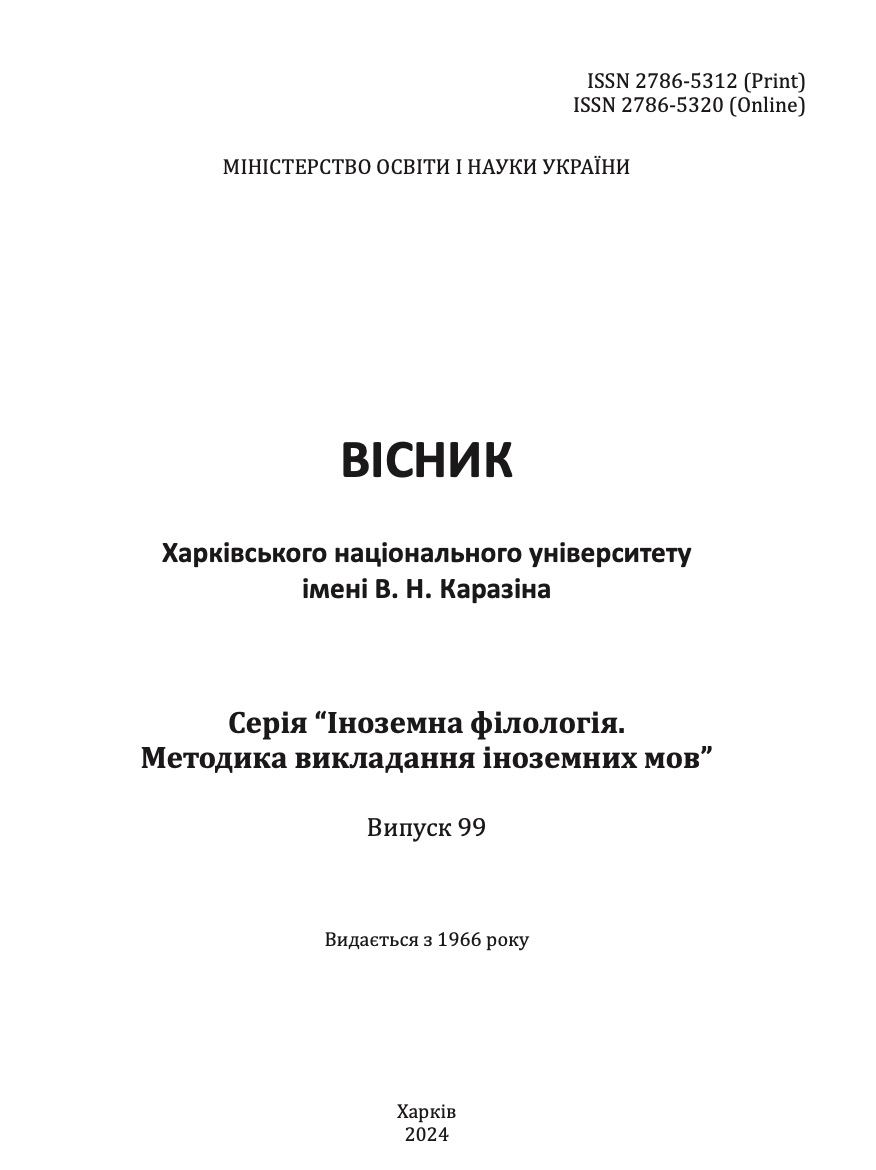Експресиви у виступах політичних діячів (на матеріалі китайської і англійської мов)
Анотація
Мета статті полягає у досліджені та порівнянні вживання експресивів під час виступу китайськомовних та англомовних політичних діячів. Актуальність обумовлена необхідністю проаналізувати засоби вираження емоцій та їх вплив на адресата, задля того щоб мати можливість вірно інтерпретувати промови політиків та розуміти їх інтенції, щоб попередити потенційні маніпулювання. Завданням цього дослідження є: розглянути поняття «дискурс», «політичний дискурс», «експресив»; проаналізувати експресиви у виступах китайськомовних та англомовних політичних діячів та порівняти їх; систематизувати експресиви; розробити класифікацію мовних засобів для вираження емоцій. Об’єктом дослідження є політичний дискурс. Предметом дослідження є експресиви у виступах англомовних та китайськомовних політиків. У статті розглянуто виразність мовленнєвої поведінки та використання мовленнєвих атак, вжитих англомовними та китайськомовними політичними діячами під час виступів. У результаті дослідження було виявлено значну кількість відмінностей в експресивах мовленнєвого етикету. Зазначено, що англомовні політики в порівнянні з китайськомовними менше дотримуються офіційно-ділового стилю. Китайськомовні політики схильні більше виявляти стан поваги до слухачів. Як наслідок, спостерігаються відмінні засоби впливу: англомовні політики «наближуються» до народу, а китайські — виявляють повагу, і це демонструє несхожість цінностей людей. Також було відзначено схожість у використанні експресивів, а саме у ввічливому вираженні невдоволення, піднесенні успіхів своєї держави та віри в краще майбутнє
Завантаження
Посилання
Batsevych, F. S. (2004). Osnovy komunikatyvnoi linhvistyky. [Foundations of Communicative Linguistics]. Kyiv: Akademiia Publ.(in Ukrainian)
Bezuhla, L. R., Kryvoruchko S. I., & Berbenets D. V. (2023). Multymodalna metaprahmatyka nimetskomovnoho reklamnoho dyskursu.[Multimodal metapragmatics of German advertising discourse]. Visnyk KhNU imeni V. N. Karazina. Seriia: Inozemna filolohiia. Metodyka vykladannia inozemnykh mov [The journal of V. N. Karazin Kharkiv National University] 98, 7-14. https://doi.org/10.26565/2786-5312-2023-98-01
Velivchenko, V. O. (2014). Komunikatyvne vyiavlennia ekspresyvnosti ta ekspresyva v suchasnii anhliiskii movi [Communicative revealing of expressiveness and expression in modern English]. Visnyk Cherkaskoho universytetu. Seriia Filolohichni nauky [Bulletin of Cherkasy University. Philological Series] 27, 28-35. (in Ukrainian).
Petrenko, V. V. (2007). Osoblyvosti vyznachennia politychnoi movy. Politychnyj menedzhment [ Features of the definition of political language. Political management] № 2, 16–24. (in Ukrainian).
Pocheptsov, H. H. (1999). Teoriia komunikatsii. 2-he vyd.[The theory of communication. 2nd Edition]. Kyiv:”Kyivskyi universytet”. (in Ukrainian).
Samokhina, V. O. (2012). Zhart u suchasnomu komunikatyvnomu prostori Velykoi Brytanii ta SShA: monohrafiia [A Joke in the Modern Communication Space of the United Kingdom and the United States]. Kharkiv: KhNU imeni V. N. Karazina. (in Ukrainian).
Shevchenko, I. S. & Morozova, O. I. (2005). Problemy typolohii dyskursu. Dyskurs yak kohnityvno-komunikatyvnyi fenomen: monohrafiia [Problems of discourse typology. Discourse as a cognitive and communicative phenomenon: a monograpy]. Kharkiv: Konstanta.
Yumrukuz, A. A. (2021). Prahmastylistychni osoblyvosti elektoralnoho dyskursu (na materiali peredvyborchykh prezydentskykh teledebativ) [Pragmatic features of electoral discourse (based on the material of the pre-election presidential TV debates)]. Visnyk KhNU imeni V. N. Karazina. Seriia: Inozemna filolohiia. Metodyka vykladannia inozemnykh mov [The journal of V. N. Karazin Kharkiv National University] 92, 66-73. https://doi.org/10.26565/2227-8877-2020-92-09
Habermas, J. (1989). Erlduterungen zum Begriff des kommunikativen Handelns // Habermas J. Vorstudien und Ergdnzungen zur Theorie des kommunikativen Handelns. - Frankfurt am Main: Suhrkamp Verl., 571-606.
Hodge, R. & Kress, G. (1988). Social semiotics. – Cambridge, United Kingdom: Polity Press.
Jeanne Tsai Culture and Emotion. Retrieved from: https://nobaproject.com/modules/culture-and-emotion#content
Searle, J. R. (1979). Expression and Meaning: Studies in the Theory of Speech Acts. Cambridge, United Kingdom: University Press.
Van Dijk, T. A. (1998). Critical Discourse Analysis. Handbook of Discourse Analysis. Oxford: Blackwell.
Van Dijk, T. A. (1997). What is political discourse analysis? Belgian Journal of Linguistics 11(1). 11–52.




